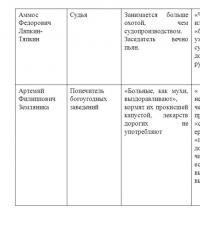What can't be mixed with what. What foods are actually incompatible for human consumption at the same time
Morning with a hangover: is it possible to interfere with alcohol?
The New Year has just come into its own, and therefore many noisy feasts are yet to come. In these difficult days for the stomach and liver (as, indeed, for the whole body!) Days, we turn a blind eye to many "impossible".
One of these "no" is the well-known rule - alcohol can not be mixed. And the reason for many is not that in this case you can get very drunk (although this also happens), but in a heavy morning hangover.
During the New Year holidays, champagne is easily mixed with vodka, vodka with cognac, and cognac is often washed down with beer. And all this often happens for the reason that people go to visit, taking a certain amount of alcohol, which, however, quickly ends.
In such cases, ideally, one should limit oneself, but, being in a state of light drunkenness, people usually easily agree to raise a glass of cognac after vodka, mixing it all with some champagne. In the morning, many bitterly regret such recklessness.
But is it really worth mixing one with the other? Or, perhaps, it is worth following the unspoken rule and going to increase the degree? Or are there other secrets that will allow you to get out of the festive alcoholic everyday life with minimal problems for your health?
Alcohol can be mixed, but how do you avoid a hangover?
At good quality, it's all about quantity
 Back in the 70s of the last century, studies were carried out on the subject of how certain alcoholic drinks containing various ingredients affect the likelihood that a person will suffer from a hangover in the morning.
Back in the 70s of the last century, studies were carried out on the subject of how certain alcoholic drinks containing various ingredients affect the likelihood that a person will suffer from a hangover in the morning. It is not only about the basic ingredients that are added to various spirits within the framework of technological process, but also about the so-called congeners (derivative compounds formed during the production process), the number of which in different types alcohol is different.
The well-known notorious fusel oils are also among the congeners. For example, it is no secret that good whiskey there are much more fusel oils than in good vodka (we are not talking about the so-called "palyonka").
On the other hand, fusel oils are always present in a certain amount in the finished drink, not only exerting an additional influence on the specific taste of the drink, but also largely determining it (for which, in fact, many people like cognac, whiskey and other products).
As a result of the above studies, it has been proven that, when it comes to good quality drinks, the key role in how severe your hangover and high level of intoxication will be in the morning is not played by fusel oils and other congerens, no matter what you mix with. The main trouble is the lack of measure.
You can’t avoid a hangover in the morning: why still you can’t interfere with alcohol?
What prevents you from feeling the measure?
 The severity of a hangover and poor health due to alcohol intoxication are mainly influenced by the amount of alcohol consumed the day before, as well as the period during which this amount of alcohol was consumed. These factors are decisive.
The severity of a hangover and poor health due to alcohol intoxication are mainly influenced by the amount of alcohol consumed the day before, as well as the period during which this amount of alcohol was consumed. These factors are decisive. According to some reports, the body of a healthy adult is capable of removing about 10 grams of pure alcohol per hour. And if such a person consumes more than his body can process, then the likelihood of a hangover increases.
This is explained simply: in the process of metabolism, alcohol initially turns into acetaldehyde, which in its properties is similar to toxic formaldehyde, and therefore is a toxic substance enough to cause poisoning of the body. But only one chemistry precedes a hangover?
Alcohol reduces the function of the prefrontal cortex, so when we drink alcohol it reduces our ability to make decisions. This is the scientific explanation for the fact that a person who swore "today to mix vodka with beer" suddenly, after a couple of glasses of the first, agrees to a glass or two of the second.
For the same reason, a drinking person begins to toast more and more often. Thus, if you start the feast with vodka and suddenly switch to a lighter alcoholic drink (beer or wine), the likelihood that you will start drinking more and raising your glass more often increases.
 This is confirmed by another study, the results of which show that people, while under the influence of alcohol and gradually increasing its consumption, tend to underestimate the amount of alcohol they drink.
This is confirmed by another study, the results of which show that people, while under the influence of alcohol and gradually increasing its consumption, tend to underestimate the amount of alcohol they drink.
Thus, if the evening was started with beer, then the transition to stronger drinks is usually (but not always, of course) carried out even when the person is in a clearer mind compared to someone who started drinking with vodka and then decided to switch for beer. Perhaps this confirms the well-known rule raise rather than lower.
A similar effect is felt by the body when the drinker mixes beer with wine. Wines are usually three times stronger than beer, and therefore, if you already have the opportunity to choose where to start the evening, then you should start with beer.
However, there is another theory according to which beer and wine should not be mixed at all (as well as vodka and wine), supposedly because what is made from grain cannot “get along” with what is made from grapes.
At first glance, there is a grain of truth here, especially given the fact that hangovers are affected not only by the amount of acetaldehyde that poisons the body during alcohol metabolism, but also by changes in the level of hormones in the body under the influence of a particular alcohol.
However, the hangover process itself is quite complex (in every sense) and individual, and also not fully understood, despite the fact that many experienced it personally. Therefore, many researchers in this case insist that, as they say, it is not wine and beer mixed in one evening that are to blame, but their quantity.
Why is a hangover worse in the morning if alcohol is mixed in cocktails?
 The above conclusion (which many consider a theory) is especially clearly confirmed when a person consumes a large number of cocktails in one evening. Constantly changing shots and longs are able to put the strongest drinker on the shoulder blades.
The above conclusion (which many consider a theory) is especially clearly confirmed when a person consumes a large number of cocktails in one evening. Constantly changing shots and longs are able to put the strongest drinker on the shoulder blades. This is explained not so much by the fact that they often contain bourbon, whiskey, gin, rum, brandy and other drinks that are distinguished by a high content of congeners, but by the amount and frequency of drinking. In addition, cocktails are rarely eaten.
An important factor is also the deceptive light and pleasant taste of cocktails, which makes us forget that we have the same alcoholic drink in front of us, causing the same (or even more severe) hangover.
Can you mix alcohol with energy drinks?
Recently, lovers of noisy sprees (especially young people) like to combine alcohol with energy drinks. From January 1 of this year, this topic becomes especially relevant, as the law on the ban on the production and sale of low-alcohol energy drinks comes into force. Obviously, now fans of such energy cocktails will start experimenting with non-alcoholic energy drinks. The reason why alcohol interferes with energy drinks is that such cocktails allegedly allow you not to get drunk longer.
 Such drinks seem to evoke a subjective sense of non-alcoholic intoxication, giving hope that the person can drink more without the known effects of the morning.
Such drinks seem to evoke a subjective sense of non-alcoholic intoxication, giving hope that the person can drink more without the known effects of the morning.
In fact, here we can talk about some kind of masking effect, when a person may not feel intoxicated for a long time while consuming alcoholic beverages. At the same time, the effect when a person is “covered” is only delayed. In this situation, a severe morning hangover cannot be avoided, as long as the drinker allows himself to consume more alcohol.
Another interesting observation: the results of a dozen studies are known, which clearly demonstrated that the reaction of a person who drank energy drinks with alcohol becomes even worse compared to those who drank pure alcoholic drinks.
Thus, by mixing alcoholic drinks with energy drinks, you are not only exposed to more likely acetaldehyde poisoning due to the fact that you can drink more, but you are also at a higher risk of injury due to more inappropriate behavior.
Observe the measure and do not interfere with alcohol - the most reliable ways to avoid a hangover in the morning
In summary, it is safe to say that a high concentration of alcohol in the blood is more likely to lead to alcohol poisoning and a severe hangover in the morning than the consumption of various alcoholic beverages in small quantities. On the other hand, if alcoholic drinks interfere (especially if you switch from high-grade to low-grade ones), it is common for a person to underestimate the level of his intoxication, which again can cause alcohol intoxication and a severe hangover.
 As a rule, people tend to blame everything not on their immoderate consumption of alcohol, but on the fact that supposedly it was not worth interfering with one another. Thus, a person tries to justify his inability to stop in time, craving for alcohol abuse.
As a rule, people tend to blame everything not on their immoderate consumption of alcohol, but on the fact that supposedly it was not worth interfering with one another. Thus, a person tries to justify his inability to stop in time, craving for alcohol abuse.
However, no one has yet conducted a targeted study of all types of alcohol on how random (random) mixing of drinks affects a person (with fixing the results).
That is why, in order to save yourself from morning headaches and intoxication of the body, it is recommended not only not to lean without measure on alcohol in these (and others) holidays but also avoid mixing alcoholic beverages.
The site provides reference information for informational purposes only. Diagnosis and treatment of diseases should be carried out under the supervision of a specialist. All drugs have contraindications. Expert advice is required!
It's no secret to you that mixing alcohol with pills is, to put it mildly, not the best idea?
According to a study published in the journal Alcoholism: Clinical and Experimental Research, 42% of people still mix them occasionally. Moreover, most often among the medications they take come across those that are, in principle, very dangerous to combine with alcohol: pressure pills, sleeping pills, antidepressants, muscle relaxants and painkillers.
"All of these types of pills react with alcohol, which in turn can lead to unexpected (and unpleasant) effects," said study co-author Aaron White of the National Institute of Alcohol Addiction. - For example: both painkillers and alcohol cause drowsiness and slow reaction times, severely slowing down the brain.
Together they make for a literally killer combo that can just shut him down - to the point of being fatal."
And this may be the most terrible, but, alas, not the only warning. “We must not allow the effect of alcohol and pills to sum up! For example, if you swallow a couple of decongestant tablets that constrict blood vessels and “grind” with strong alcohol, their effects will overlap, and the risk of internal bleeding will increase significantly! White warns. “Even some relatively “innocent” pills, say, for a cold, when combined with alcohol, can lead to serious consequences, such as problems with the kidneys, liver or stomach.”
What if you are taking pills, and ahead is a corporate party, inevitable like death and taxes? In other words, how to minimize the damage if you still have to drink?
“It depends a lot on how much you are going to drink and the duration of the pill,” explains the scientist. - In order to “process”, say, a glass of wine, your liver needs about an hour and a half. If at ten in the evening at dinner you plan to drink three glasses of red, and at twelve - to take sleeping pills, you are at great risk: it is likely that the effect of unremoved alcohol will add up to the effect of the pills.
And no, this does not mean that your sleep will be even stronger. Quite the opposite: people who mixed sleeping pills with alcohol suffered from exhausting restless dreams and nightmares.
“The only right decision in this case would be to consult a doctor or pharmacist about the period for which the drug is excreted from the body - and “take it on the chest” only after its expiration. In addition, be sure to read the contraindications, as well as the principle of the drug. You will see there effects similar to the effects of alcohol - watch out!
Winter came. Coming new year holidays with plentiful feasts. For most of our compatriots, the fun lasts at least a week. At this time, few people can resist overeating and drinking alcohol. The consequences are felt already in the first days of the coming year: malaise and discomfort traditionally arise as a result of excessive intake of strong drinks.
According to the results of the studies, the causes of health problems are not only the large amount and low quality of alcohol consumed, but also some dishes served as snacks. We bring to the attention of readers a list of products that should not be consumed simultaneously with alcohol.
It is typical for participants in a Russian feast to drink strong alcohol with carbonated drinks. This is fraught with very unpleasant consequences, since carbon dioxide irritates the gastric mucosa and increases the rate of absorption of alcohol. As a result, intoxication occurs very quickly, a person ceases to control himself and drinks much more than would be safe for health.
Those who are used to drinking alcohol with mineral water or sweet soda experience severe hangovers over time.
Source: depositphotos.com
The use of drinks containing caffeine and other tonic substances together with strong alcohol can cause real harm to health. These mixtures contain carbon dioxide, which provokes rapid intoxication. In addition, they cause an increase in blood pressure, spasms of cerebral vessels, impaired renal function, the development of cardiac arrhythmia, and sometimes convulsions.
For people with diseases of the cardiovascular system, alcohol intake in combination with energy drinks is fraught with such serious consequences as stroke and myocardial infarction.
 Source: depositphotos.com
Source: depositphotos.com
Pickled vegetables are one of the traditional snacks of the Russian feast. Meanwhile, the use of blanks containing acetic acid as a preservative creates an increased burden on the liver and kidneys. In combination with ethyl alcohol, this increases the stress experienced by the body.
Salted vegetables are preferred as a snack for strong alcoholic drinks, which help maintain the body's water-salt balance and fight dehydration. BUT the best option is a vegetable mixture, which includes boiled potatoes (natural adsorbent), beets, pickle(sources of trace elements), sauerkraut(a storehouse of vitamins), that is, vinaigrette. Our ancestors who ate classic vinaigrette, discovered a great way to support the body during a feast.
 Source: depositphotos.com
Source: depositphotos.com
The fact that fresh tomatoes in combination with strong drinks (especially vodka) provoke flatulence and other digestive problems has been experimentally confirmed. Apparently, some organic acids contained in tomatoes play a negative role in this case.
Interestingly, tomato processing products (natural and reconstituted juices from tomato paste, canned natural tomatoes in own juice etc.) do not have such properties. Their use together with alcohol does not cause negative reactions from the digestive system.
 Source: depositphotos.com
Source: depositphotos.com
The combination of strong alcohol with chocolate overloads the pancreas. As a result, intense pain in the abdomen, cramps and serious malfunctions of this organ, up to the development of acute pancreatitis, can occur.
 Source: depositphotos.com
Source: depositphotos.com
With the simultaneous ingestion of a large amount of fast carbohydrates, fat and ethyl alcohol, the body establishes the sequence of assimilation of the received substances. The sweet component is processed first, which makes it possible to obtain glucose. During this time, fats have time to form an enveloping film on the walls that prevents the absorption of alcohol. The result is delayed alcohol utilization, prolonged intoxication and a severe hangover.
 Source: depositphotos.com
Source: depositphotos.com
Animal fats and products of their heat treatment have a stressful effect on the liver, gallbladder and stomach. In the presence of alcohol, this effect is enhanced. For a person who has problems with digestion, such a “hit” is fraught with a serious exacerbation of ailments, and even with good health, a feeling of heaviness in the stomach and disturbances in the functioning of the intestines are very likely.
As a snack for strong alcohol, lean meat (boiled or baked), fish and seafood are suitable. With a small amount of fat, protein foods of animal origin are digested slowly, while creating conditions for the gradual absorption of alcohol. This allows you to avoid strong intoxication for a long time and does not lead to a severe hangover.

Let's talk about health today. More specifically, about the popular question: what should not be mixed with alcohol. Any doctor, when prescribing some kind of medicine, immediately reports whether it can be combined with alcoholic beverages. But we will start with combinations of alcohol with alcohol, believe me, there are also many prohibitions here.
Alcohol and alcohol
You can not mix drinks that are too different in production technology: champagne cannot be combined with vodka, whiskey or cognac; strong alcohol will not tolerate beer and unaged wines; rum and brandy are best not mixed with liqueurs. But here we are not talking about some cocktails, they have different rules.
The combination of champagne with strong drinks will cause a strong and quick intoxication, and then also a terrible hangover. The carbon dioxide contained in champagne irritates the gastric mucosa and increases the absorption of alcohol into the blood.
All carbonated drinks mixed with alcohol work according to this scheme. If you want to mix vodka, cognac or whiskey with mineral water and sweet sodas, it's better to think twice. For example, a gin and tonic cocktail, oddly enough, will make you drunker than pure gin.
When combining alcohol with alcohol, remember that it is not different strengths that are decisive, but differences in biological activity. Vodka, for example, is absorbed more slowly than wine, and cognac is more depressing nervous system than liquor.
The last point is much more important than the previous ones: the combination of alcohol with energy drinks is extremely dangerous for life. This leads to a sharp increase in blood pressure, hypertensive crises, impaired kidney function and other life-threatening conditions.
Alcohol and drugs
We will not scare you with specific diseases, we will simply and briefly write a list of drugs that cannot be combined with alcohol. In some cases, alcohol neutralizes the effect of the active components of drugs, and in some cases it can lead to coma and other terrible consequences.
- Aspirin
- Caffeine
- Diuretic
- Paracetamol
- Insulin
- Painkiller
- Anti-inflammatory
- Hypnotic
- Antibiotics
The last advice we repeat often: you need to know the measure in everything. Let alcohol bring pleasure, without compromising health.
About wine 13.10.2015
Decantation and aeration
Wine is a "living" product, it breathes, changes, matures. Therefore, the correct consumption of wine is a complex and exact science, and it is easy to get lost in the terms associated with wine. For example, two very similar concepts: decantation and aeration. How do they differ? And what do you need to know about them? Decantation A very simple definition of this term can be given: decantation is the pouring of wine from a bottle ...
→About wine 15.09.2015
Champagne Pyramid
Someone in films, someone at a banquet, but almost everyone saw this miracle - a champagne pyramid. Sometimes you can find the name "slide" or "cascade" of sparkling. Who and when came up with the idea of building a pyramid of glasses - history is silent. But the essence has not changed. long years: the pyramid is quite complex, but at the same time effective reception which will help to fill glasses quickly and beautifully. Mastery…
When drinking alcohol, it is necessary not only to know your rate, but also the strength of certain alcoholic beverages, the technology of their production, as well as the effect that they can have on the body when mixed. Otherwise, a fun holiday runs the risk of turning into a real hell.
Vodka + champagne or beer
Drinking champagne or beer along with vodka can result in rapid intoxication, and, consequently, loss of control over oneself and one's actions, as well as a subsequent heavy hangover. The fact is that champagne and beer contain carbon dioxide, which significantly reduces the time it takes for alcohol to be absorbed into the bloodstream. Getting on the gastric mucosa, the carbonated drink foams and thereby increases the rate of absorption of the liquid. Moreover, this happens not only in the stomach, but also continues in the intestines.
That is why you should not mix vodka with any carbonated drinks. Most often, the consequence of the use of these explosive mixtures is intoxication of the body, which is accompanied by headache, dizziness, nausea and apathy.
However, beer goes well with barley-based whiskey. The secret of such a tandem is simple: for the production of such whiskey, as well as for the production of beer, the same raw materials are used. That is why the ingredients of these drinks practically do not affect each other.
Wine + beer
Wine and beer are also not recommended to be consumed together. Even the old English proverb reminds of this: "Either grapes or grain." And indeed it is various technology The production of these drinks is the root cause of the morning hangover: wine is made from grapes, and beer is made from grain.
If you intersperse a glass of drunk wine with a glass of beer, then, most likely, you will soon begin to feel sick. And to the one who has a stronger stomach, a terrible hangover will come in the morning. The fact is that wine has an acidic reaction, therefore it irritates the gastric mucosa, helping to reduce its protective properties. And the beer saturated carbon dioxide only speeds up and aggravates this process.
Whiskey + cognac
Whiskey and cognac are also diametrically opposed drinks. The first is made on the basis of grain raw materials, and the second - from grape alcohol. And the strength of whiskey and cognac is somewhat different. So the strength of whiskey is 39-40 degrees, and the strength of cognac is 40-42 degrees. For alcoholic beverages, this is a significant difference. Hence the heavy hangover and gloomy morning.
Vodka + wine
Real wine is made exclusively from natural ingredients, the main of which, of course, is grapes. That is why the wine is quickly absorbed into the gastric mucosa. While vodka penetrates the blood much more slowly. Therein lies the insidiousness of this combination. Wine, being not a very strong drink, does not give such intoxication as vodka. Swapping a glass with a shot may seem like you're not getting drunk. In fact, the wine will already begin its work, and vodka will declare itself much later. And then, when both alcoholic drinks begin to act, you will quickly leave for nirvana. And the next morning, and maybe the whole next day, is unlikely to be joyful for you.
See also: the choice of the editors of the "Russian Seven"





